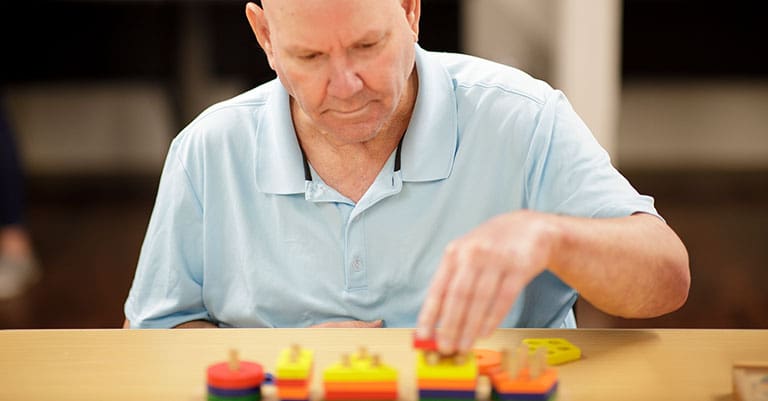Activities of Daily Living, or ADLs as they’re commonly referred to, are grouped into lower level and higher level tasks or actions that bring purpose and meaning to a person’s life. ADLs in your life could be getting ready for work each morning, preparing meals, or taking care of children. Although these activities are often taken for granted, brain injured individuals have to work diligently to rebuild the skills necessary to successfully complete these day-to-day tasks.
Nexus Specialty Hospital Occupational Therapist Doreen Garcia explained, “ADLs are meaningful to the patient and are often related to self-care. Most people tell me they just want to be able to take care of themselves. Activities like using the restroom, bathing, or dressing at the highest level possible are universal needs.”
While ADLs are different for everyone, almost every patient starts with the basics, like bathing and grooming, to dressing and toileting. Doreen explained the occupational therapy team starts with these activities since patients have been doing them their entire life, making them easier to learn again.
“When patients come to Nexus Specialty Hospital, they have a traumatic brain injury or cognitive dysfunction, which hinders their capacity to learn or retain information,” explained Doreen. “We develop our plan based on their cognitive level, goals for the future, and personal preferences.”
The lowest level of patients the team works with are those in a coma or persistent vegetative state (PVS). Although these individuals are not able to actively participate since they are not yet alert, the team focuses on sensory processes that will help improve wakefulness. The team might move their limbs or sit them up in bed. In addition, they provide tactile input and visual and olfactory stimulation — all in an effort to increase alertness.
“We also work with patients who are somewhat alert but not functional or purposeful in their actions,” said Doreen. “To help them progress to the next phase, our team works on components they’ll need to successfully perform ADLs, which could include developing motor skills, improving strength and balance.”
At this stage of occupational therapy, think of the skills patients are working on as building blocks. As more components are practiced and mastered, individuals are set up to have greater success with higher level ADLs.
When patients are awake, alert, and potentially moving on his or her own, Doreen explains the team begins work on cognitive functions, including attention and focus — both imperative so daily tasks can be performed to completion.
“We’ll start with a simple action, like brushing your hair. Instinctively, if you put a person’s hand to their head and start the motion, they’ll begin to pick up that same motion and start brushing for themselves,” said Doreen. “In these sessions, we might work on only one task, but we don’t lose focus on the goal. We might hold the brush in the patients hand the whole time and let go at the end so they can complete the task.”
As the injury progresses and patients improve, the occupational therapy team plans for activities in context. For example, most people don’t brush their teeth while lying in bed. Instead, you stand or sit at the sink. Doreen shared that part of relearning ADLs is providing an appropriate setting. The new rehabilitation gym at Nexus Specialty Hospital features an ADL kitchen for purposeful therapy.
“Before, we would position a patient behind a table to put peanut butter and crackers together, but that isn’t typical,” said Doreen. “Now, we can direct patients to stand at the counter and reach into the cabinets to take down the ingredients they need to cook something.”
At this time, patients work on higher level activities, such as cooking, cleaning, holding a job, managing finances or medications, or taking care of children or animals. ADLs also include leisure activities tied to a person’s unique interests.
“I have had patients who loved to cook or play an instrument and the ability to do those things again was what they cared about most. Then I’ve had other patients who were bed bound, so they were more interested in relearning how to operate their phone,” said Doreen. “We ask patients and their families what activities are most important, and then we devise a plan to help them relearn the skills to meet those goals.”
Working on skills personal to an individual’s specific goals and interests is very motivating. While being able to sit up and then stand are the first steps towards cooking, playing an instrument, or most other higher level ADLs, patients see more value and engage more when they are working on specific components to their goal, like stirring a bowl or plucking a guitar.
In some cases, patients can’t complete every activity the way they did before an injury. Doreen explains collaborating with patients and figuring out adaptations to ensure her patients can continue performing those more challenging activities is the most rewarding part of the job.
“I had one patient who couldn’t bend down to feed her dog on the floor, so we created this giant ladle to scoop the food and pour in the bowl,” explained Doreen. “The patient and I worked together to solve this problem so she could complete that meaningful activity.”
Nexus Specialty Hospital’s occupational therapy team works to prepare patients for more intensive rehabilitation at facilities like Nexus Neurorecovery Center. Their overall goal is readying patients to move from level to level, which will ultimately help them progress to the highest level of independence — which for many is going home.
“My job is all about one word: independence. That’s what I’m going for,” said Doreen. “I’m working with patients to ease the burden on family members who are caring for them, as well as to get them to the highest level of independence to have the best quality of life.”
